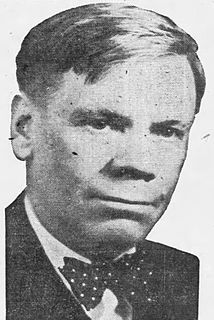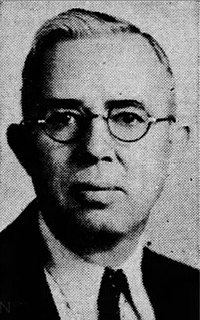
Sidney Preston Osborn was the first secretary of state of Arizona, and later the seventh governor of Arizona and is, as of 2019, the only governor of Arizona to be elected to four consecutive terms. Osborn is also the second native-born governor of Arizona, preceded by Thomas Edward Campbell.

Rawghlie Clement Stanford was the fifth governor of Arizona and served from 1937 to 1939. He later served on the Arizona Supreme Court from 1943 until 1955, including 3 years as Chief Justice.

The 1914 Arizona gubernatorial election took place on November 3, 1914 for the post of the Governor of Arizona. The Supreme Court of Arizona ruled that there would be no statewide elections in 1912, thus extending the terms to sync up with elections on even years. The Democratic nominee was incumbent governor George W. P. Hunt, his Republican opponent was the final Delegate to Congress from Arizona Territory, Ralph H. Cameron. Cameron was disadvantaged by the same reason the previous Republican nominee Wells was: he had opposed statehood with the present Constitution.

The 1916 Arizona gubernatorial election took place on November 7, 1916 for the post of the Governor of Arizona. Due to battles between labor and business, the Hunt administration was facing severe electoral backlash. After facing a fairly strong primary by former Council member George Olney, Hunt prevailed and went on to face the closest election in Arizona gubernatorial history. The initial results of the 1916 election were extremely close, with Campbell winning by only 30 votes.

The 1918 Arizona gubernatorial election took place on November 5, 1918 for the post of the Governor of Arizona. Thomas Campbell, who served a partial term in 1917 and had his election overturned by the Supreme Court of Arizona, returned to contest the Governors office. Incumbent Governor Hunt declined to run again after the stress of the close elections and the year-long court battle. Despite falling to its lowest percentage in years, the sole third party challenger held the difference between the two candidates. The Democratic challenger was state senator Fred T. Colter, a pro-Hunt Democrat.

The 1922 Arizona gubernatorial election took place on November 7, 1922. George W. P. Hunt was Arizona's first governor, after retiring in 1919 he served as Ambassador to Siam during the tail end of the Wilson administration. After being dismissed by Harding, Hunt returned to Arizona and decided to contest his old seat. Both Hunt and Campbell faced off in 1916, the closest gubernatorial in Arizona history. This election was the highest percentage of votes Hunt ever got in his 7 gubernatorial races.

The 1924 Arizona gubernatorial election took place on November 4, 1924. Despite being a Republican year nationally, President Coolidge's election in Arizona was rather close. He only took Arizona with 40% of the vote against Davis' 35% and La Follette's 23%. The closest Arizona gubernatorial election since 1916, Hunt's lead in votes would continue to decline.

The 1928 Arizona gubernatorial election took place on November 6, 1928. Despite a fairly poor economy, a 15-point loss by Al Smith for the Arizona electoral votes, and having served for nearly 6 full terms, Hunt only narrowly lost the general election. Other state Democrats like Senator Ashurst and Representative Douglas both won re-election. John C. Phillips became the second Republican to serve as Arizona Governor, and the first to beat Hunt in a general election.

The 1930 Arizona gubernatorial election took place on November 4, 1930. George W. P. Hunt narrowly won the general election in 1930, defeating incumbent governor John Calhoun Phillips, who had defeated Hunt in his bid for reelection in the previous election year in 1928.

The 1934 Arizona gubernatorial election took place on November 6, 1934. Incumbent Governor Benjamin Baker Moeur ran for reelection, he was challenged by former governor George W. P. Hunt and future Governor Rawghlie Clement Stanford in the Democratic primary, but he defeated both of them by a comfortable margin.

The 1936 Arizona gubernatorial election took place on November 3, 1936. Incumbent Governor Benjamin Baker Moeur ran for reelection, but he was defeated in the Democratic primary by former judge of the Maricopa County Superior Court Rawghlie Clement Stanford.

The 1938 Arizona gubernatorial election took place on November 8, 1938. Incumbent Governor Rawghlie Clement Stanford declined to run for reelection, with pharmacy and cattle ranch owner Robert Taylor Jones winning the Democratic nomination to succeed Stanford.

The 1940 Arizona gubernatorial election took place on November 5, 1940. Incumbent Governor Robert Taylor Jones ran for reelection but was defeated in the Democratic primary by former Secretary of State Sidney Preston Osborn, whom Jones had previously defeated in 1938.

The 1942 Arizona gubernatorial election took place on November 3, 1942. Incumbent Governor Sidney Preston Osborn ran for reelection, and easily defeated a challenge from former Governor Robert Taylor Jones in the Democratic primary, who Osborn also defeated in 1940.

The 1944 Arizona gubernatorial election took place on November 7, 1944. Incumbent Governor Sidney Preston Osborn ran for reelection, and easily won the Democratic primary, with only token opposition as former Governor Robert Taylor Jones declined to challenge Osborn to a rematch following two losses, in 1940 and 1942.

The 1946 Arizona gubernatorial election took place on November 5, 1946. Incumbent Governor Sidney Preston Osborn ran for reelection, easily winning the Democratic primary, as well as defeating Republican challenger Bruce Brockett in the general election, and was sworn into his fourth term as Governor on January 7, 1947. Osborn died in office a year later.

The 1948 Arizona gubernatorial election took place on November 2, 1948. Following the death of Governor Sidney Preston Osborn while in office, Dan Edward Garvey, who was serving as Secretary of State of Arizona was ascended to the position of governor, and thus ran for a full term. Facing a crowded primary field, Garvey emerged successful as the Democratic party's nominee.

The 1954 Arizona gubernatorial election took place on November 2, 1954. Incumbent Governor John Howard Pyle, the first Republican elected to the office in two decades, ran for reelection for a third term.

The 1960 Arizona gubernatorial election took place on November 8, 1960. Incumbent governor Paul Fannin ran for reelection against former Democratic state representative Lee Ackerman in the general election, easily winning a second term. Fannin was sworn into his second term on January 3, 1961. Both candidates ran unopposed in their respective party's primary.

The 1966 Arizona gubernatorial election took place on November 8, 1966. Incumbent Governor Samuel Pearson Goddard ran for reelection to a second term as Governor, narrowly winning the Democratic Party nomination as he was challenged by Justice of the Peace Norman Green.














